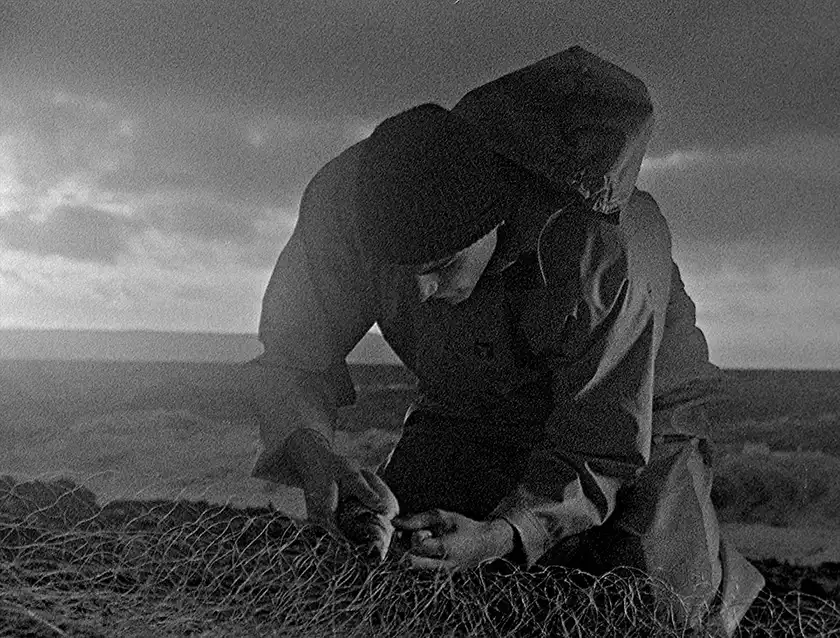In Bait, debutant director Mark Jenkin crafts a claustrophobic analogic parable of damnation by eternal recurrence – and takes British cinema, quite literally, to the sea.
Whenever British cinema feels the need to start over, it goes, quite literally, to the sea. It was 1895 when experimental directors Robert W. Paul and Birt Acres embarked in the quest for the perfect still shot of battering waves on the Claptonian white cliffs of Dover. They found what they were looking for, and their 39 seconds of footage went down in history as Rough Sea at Dover, which became the unchallenged darling of early British cinema goers. And now, more than a century later, filmmakers are washing ashore again. But not quite in Kent.
To be precise, it takes a 6 hours’ drive to get from Dover to Cornwall, where almost-débutant Mark Jenkin shot and set his acclaimed first major feature, Bait. The film is the story of a cove fisherman, Martin Ward (Edward Rowe), who, despite financial difficulties and appalling living conditions, proudly resides in his godforsaken shanty hometown. He has a brother, Steven (Giles King), and a nephew (Neil, played by Isaac Woodvine). He likes going to the local pub and grinning at middle-aged barmaid Liz (Stacey Guthrie). But above all, Martin has a dream: he wants to buy a boat to expand his fishing business. Therefore, when touristic season unloads its burden of wealthy, snobbish people on Martin’s daily routine, things are bound to go awry.

Jenkin sets up a topical conflict; a nightmare of eternal recurrence presented through the formal lenses of early (Russian) avant-garde cinema. Shot in adorably glitching Kodak 16mm and 4:3 aspect ratio, Bait basks in summer’s violent sunlight. Jenkin’s cinematography drips light and shadows over the actors, transfiguring their faces and smearing them with that distant metaphysical look that makes Giorgio De Chirico’s paintings incomparably fleshy – and virtually untouchable at the same time. Just like Bait’s frames are, the scope of the confrontation is so narrow it’s claustrophobic. Jenkin decides to relinquish extension in favour of depth. And to mousetrap the audience into a bidimensional nightmare.
If skilfully applied, shot composition and jump-cut editing are indeed merciless instruments of psychological torture. And Jenkin proves a seasoned craftsman as he edits and counter-edits and piles up eerie close-ups of objects and of bodies touching those objects. This is angst by accumulation – and by the literal absence of camera movements. Sometimes, this hovering paranoia explodes in bursts of deafening synth-industrial music composed by Jenkin himself. As a result, Bait buzzes with a kind of looming static Bergmanian irresoluteness. Witnessing a director taking film form seriously is unequivocally arousing.
I doubt Ken Loach has started looking for an heir already. If I’m right, then I’d suggest he stayed put, because budding ex-documentarist Jenkin might grow to be his bitterest enemy. Jenkin seems to have found a new way of giving voice to that part of the UK that speaks with neither Jane Austen nor the Brontë Sisters’ words. And, even though the dialogue lags a little behind the flawless joint work of technical cinematic means, Bait rightly deserved the BAFTA for Outstanding Debut by a British Writer, Director, or Producer. Jenkin was consecrated as a film artisan, an all-round Renaissance courtesan in the hyper-modern cinematic universe. Now, the challenge lies ahead. Will this shooting star be able to outstrip his own deeds, or is he doomed to fall into the pit of exploit achievements?
I guess that time will tell (and production budget, of course). But I’m really looking forward to meet this director again. Hopefully on the next BAFTA red carpet. Who knows, maybe even something bigger. All in all, Martin’s dream might have been to buy a boat and become the greatest fisherman of all. Nevertheless, I believe that his dad has bigger plans for himself. And I wish him good luck in this ghastly, exciting world.
Bait is now available on DVD, Blu-Ray and the BFI iPlayer.

